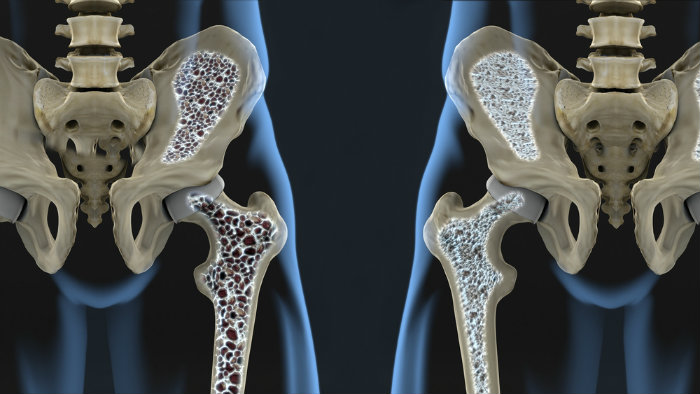MS, Osteoporosis and Men – What a Guy Needs to Know
Written by |


Osteoporosis (fragile bones) is only a women’s problem, right?
Wrong, especially if you have multiple sclerosis — as I’ve discovered.
Osteoporosis causes bones to become weak and brittle. A fall that probably wouldn’t harm a healthy person can easily break the bone of someone with osteoporosis. When the disease is advanced, even a strong cough can cause a fracture.
Osteoporosis risk is greater for people with MS
Doctors usually consider the primary cause of osteoporosis to be the abrupt loss of estrogen that happens in women during menopause. But according to the National Multiple Sclerosis Society, there’s an increased risk of the disease for anyone with decreased mobility — people who use wheelchairs, scooters, etc., or who are bedridden. Using steroids, such as the drug Solu-Medrol, can also result in a loss of bone density. That means people like you and me — people who live with MS. Add to that our risk of tripping and falling when we are up and around … well, you get the picture.
Osteoporosis consequences are greater for guys
A study by Dr. Robert A. Adler, an endocrinologist at the Veterans Affairs Medical Center in Richmond, Virginia, points out that not only are men susceptible to osteoporosis, the consequences for men are greater than they are for women. Dr. Adler’s research shows that a man who breaks a hip, for example, is more likely than a woman with a busted hip to become permanently disabled and twice as likely to be dead within the following year. But men, according to Dr. Adler, are less likely to get tested for osteoporosis, or to receive treatment, because many doctors consider it to be a women’s disease. In his study, published in the journal Nature, the doctor says that needs to change. “The realization of the risk of fracture and fatality has led to some increases in evaluation and treatment in men, but it is clear that many men have no attention paid to their fracture risk, despite obvious risk factors. … The serious consequences of fracture in high risk men need to be appreciated by both patients and clinicians.”
Endocrinologist Sundeep Khosla of the Mayo Clinic, quoted recently in the The New York Times, recommends that “Every man over 70 should have a bone density test, and if they have other risk factors, depending on which ones, they should be tested soon after 50.”
Testing is easy
There is a quick, painless test to measure bone density. It’s called a dual energy X-ray absorptiometry (DXA). That mouthful is commonly called a Dexa-Scan, and I had one about three years ago. It showed some reduction in my bone mass, so my primary care doc prescribed alendronate, the generic of Fosamax, a once-a-week pill. It seems to have stabilized that deterioration. There are several drugs that are similar and your own doctor should be able to recommend one that’s best for you, if it’s necessary.
There’s more about osteoporosis risks, tests, and drugs on the National MS Society’s website.
(You can read more of my columns on my personal blog: www.themswire.com)
Note: Multiple Sclerosis News Today is strictly a news and information website about the disease. It does not provide medical advice, diagnosis, or treatment. This content is not intended to be a substitute for professional medical advice, diagnosis, or treatment. Always seek the advice of your physician or other qualified health provider with any questions you may have regarding a medical condition. Never disregard professional medical advice or delay in seeking it because of something you have read on this website. The opinions expressed in this column are not those of Multiple Sclerosis News Today, or its parent company, Bionews Services, and are intended to spark discussion about issues pertaining to multiple sclerosis.



Tim
I was diagnosed with RRMS (Relapse-remitting M.S.)in 2006. Early in my treatment, I received powerful Solumedrol infusions regularly for about a year or so. And I have been mobility-challenged due to some of my M.S. symptoms (left leg weakness, poor coordination, serious balance and gait issues and mostly sitting down or in a wheelchair). Last year at the age 53, falling the couple of feet to our carpeted bedroom floor from my wheelchair, I fractured my right hip and so required right hip replacement. After having a subsequent Dexa-Scan, I learned I had "severe" osteoporosis and am now taking alendronate (generic Fosamax) weekly.
I have fallen several times each of the several years before my fracture without any lasting ill effect, and so was very surprised by my hip fracture. A 53-year-old man should not break a hip falling two feet, right?
Ed Tobias
Hi Tim,
Thanks for taking the time to share that information. I'm very fortunate that I've not been hurt when I've fallen and that my primary doc suggested a DEXA scan few years ago, because she knew my drug history. I've been on Alendronate since then.
I'm sorry about the hip fracture but I hope that you're doing well with the new one.
Ed